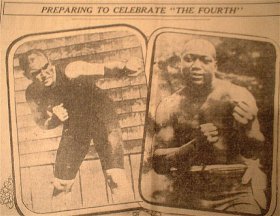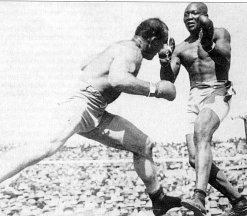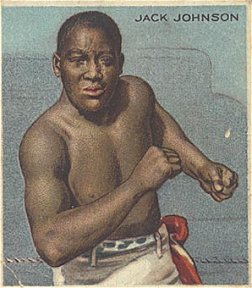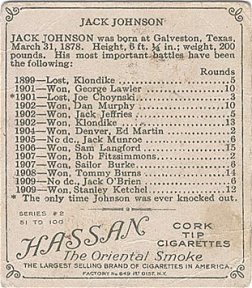Get comfy friends, this is going to be a bumpy
startling ride.
In the first volume of the trilogy, The Mucker,
ERB sets the scene for his remarkable psychological resolution. The idea
of what he was doing apparently only occurred to him at the end of that
story at which point he introduces the notion of Byrne being a boxer.
In The Mucker, having the need to be of service
to his oppressor, Burroughs sets out to demonstrate that the Irish Mucker,
John the Bully, had reasons for his behavior.
He, in the person of the Irish protagonist Billy Byrne,
is accused of murder in Chicago. John the Bully had actually murdered ERB's
Anima and possibly his Animus. Byrne flees to San Francisco where he meets
tougher men than he who shanghai him. He ends up on Barbara Harding's yacht.
Comes the squall, yacht sinks, survivors reach jungle island, Byrne and
Harding become separated from the others, come upon a primitive people
in the jungle. So far we are dealing with Burroughs' inner realities but
then, amazingly, amongst this nondescript savage tribe are members of an
abandoned group of medieval Japanese Samurai. Pretty startling, even if
you expect Burroughs to be startling.
The attentive reader asks how did the surprise originate?
Why Japanese Samurai? As usual Burroughs is paying close attention to contemporary
affairs but in giving "a definite impression of fictionalizing" to it or
in writing in another key we tend to dismiss this strange interjection
as mere phluph.
Let's look for some possible sources for Burroughs' surprising
detail.
Beginning in the sixteenth century White Europeans began
the infiltration or invasion of Asia. First came the Spanish and the Portuguese.
The Chinese referred to these invaders as South Sea Barbarians because
they came up from the South Seas.
The Iberians brought Catholic missionaries with them who
began naturally to proselytize. Invading South Honshu of the Japanese Empire
they made great inroads in the cities of Hiroshima and Nagasaki. Ever heard
of these places before? They bid fair to convert all Japan to this strange
religion unless they were stopped. The Japanese tried extreme measures
of discrimination against the alien faith such as torture and murder. These
measures failing they closed Japan off from the world.
Whereas Japan previously had been an oceanic trading nation
all ocean-going vessels were destroyed. No Japanese could leave, no missionary
could enter.
This policy endured for two hundred years as the French,
English and Americans invaded the rest of Asia annexing tremendous land
masses including parts of China. The Japanese were content in their seclusion
but the Euro-Americans looked upon Japan as a great commercial opportunity
for their wares going to waste. Then as now Euro-Americans were deficient
in their psychology.
"Those people must open their doors to the world," we
said. Matthew Perry (Burroughs has a character named Abner Perry in the
Pellucidar series who becomes an admiral) was sent with a couple hundred
cannon to tell the Japanese what we thought they must do. A couple hundred
cannon against those without them is a pretty convincing argument; as our
own Mafiosi would say, an offer they can't refuse. Japan opened its doors
to the world.
Enter the law of unintended consequences.
The West had negated the Japanese Animus, Ego or Will.
In other words the little yellow men suffered a feeling of castration.
Now, these were the very kind of men Americans profess to admire -- men
of high spirit. Before closing off the country wild Japanese sailors had
been the terror of the Orient. In South East Asia they were not allowed
ashore with weapons. Feisty! To use a word of which Americans approve.
T.R. was to give them a "Bully" when they made a surprise attack on the
Russians. Americans withdrew the "bully" when the same tactic was used
on December 7, 1941 at a place called Pearl Harbor.
Now, the Japanese tactic for foiling the European invasion
in the 1600s hadn't worked. The Europeans hadn't gone away. What was left?
The East Asian Co-Prosperity Sphere for the expulsion of Euro-Americans
from all of Asia. They needed a little time to effect that desideratum.
For the present Japan realized that they had to modernize
along European scientific lines to succeed. They chose Germany
as their model for modernization. They had already seen the Spanish, Portuguese,
English, French and Americans not wanting to have anything to do with them.
Interestingly they refused to lick the boot of the oppressor. One wonders
what their response would have been had they already seen the Germans.
Within a generation the Japanese had reorganized their
system along European political and scientific lines. They became involved
in world affairs in the most aggressive manner. They took their guns to
town. They needed to release the cathartic energy of the fixation given
them by Perry and the United States.
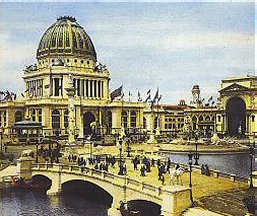 Enter
seventeen-year-old Edgar Rice Burroughs.
Enter
seventeen-year-old Edgar Rice Burroughs.
During the Columbian Exposition of 1893 in Chicago Young
Burroughs spent the summer at the Chicago World's Fair driving a demonstration
electric auto for his father's American Battery Company.
Driving any kind of horseless carriage in 1893 was cutting
edge without a doubt. Mind-blowing in itself, the Exposition was something
else going far beyond electric cars.
Jack Olmstead, the landscape architect for the Fair, had
created an Arcadian paradise known as the Wooded Island in the center of
the Fair. He had insisted that it be but a pleasure garden with no exhibits.
He had repulsed several spirited attempts to annex a location on it with
success. Nevertheless the Japanese successfully invaded the sacred soil
of his precinct. He had to cede them the North East corner of his island
where they created a little Japan. Symbolic, hey? Japan a series of islands,
little Japan on an island in the United States not too dissimilar in form
from Honshu.
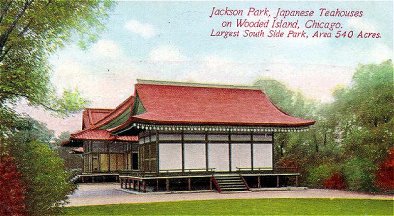
The Fair made a tremendous impression on Young Burroughs;
echoes reverberate throughout the corpus. As he drove his electric car
up and down the Plaisance or Midway his approach to the Wooded Island in
a moment of leisure would have been the bridge at the South end of the
island or the Northwest bridge. From either location he would have traversed
dense foliage to suddenly burst upon this exotic authentic Japanese village
right in the middle of Chicago. Put yourself in his place.
Walk the same mile in his shoes; imagine your surprise
in 1893 when few people had traveled in the East, when large numbers had
never even heard of Japan. Do you think your jaw might have dropped? Breathless,
breathless, that's what I would have been. This wasn't any cheap Disney
imitation.
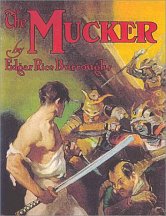 Now,
flip ahead to Byrne and Harding as they come out of the jungle to burst
upon this scene of Samurai warriors. Nice job of fictionalizing, huh?
Now,
flip ahead to Byrne and Harding as they come out of the jungle to burst
upon this scene of Samurai warriors. Nice job of fictionalizing, huh?
But, leaving the conquest of the Wooded Island behind
them the Japanese next invaded China in 1895. A slightly larger job, they
were no less successful than in Chicago. They collected a bundle of boodle
in reparations; they learned something from those crafty Irish politicians
in the Windy City.
Well, when you're on a roll, don't stop. Successful in
Chicago and China the Japanese began the invasion of California sending
paramilitary troops by the thousands. California wasn't Chicago; the Californians
had already defeated the Chinese invasion getting the Chinese Exclusion
Act passed in 1882. They now wanted a Japanese or even Asian Exclusion
Act. Bully TR who was on the East Coast far away wouldn't hear of it.
While he pondered a solution Jacob Schiff, a Jewish financier
of New York raided the Equitable Assurance Society of a couple hundred
million to finance the Russo-Japanese war of 1905. Don't think he wasn't
feted as a hero in Japan after that one.
Then in 1908 TR reached a "Gentlemen's Agreement" with
the Japanese Emperor to limit the invasion of California to "doctors and
lawyers" rather than mere paramilitary privates. That was a good deal but
the Emperor still howled discrimination.
To assuage their hurt feelings the Japanese annexed Korea
in 1910, turning their fury on them. Thirty-five years of Japanification.
No wonder the Californians got so hostile. They didn't want any of that
stuff. The Koreans should have passed a Japanese Exclusion Act too.
Then the Japanese turned to fortifying the islands in
preparation for the attack on the United States. No? Even as he concluded
the Gentlemen's Agreement, TR muttered to his cronies that we would be
at war with the Japanese within a generation. Everybody knew it and
it was true, although it took thirty-three years which is a smidgen more
than a generation.
Moving outside the story a trifle, having adopted German
manners, the Japanese cagily declared war on the Germans in the Great War,
demanding the German island possessions as compensation while establishing
a toe hold in China by receiving Germany's rights in Shantung province.
How's that? The Allies gave away what didn't belong to them? Some war to
make the world safe for Democracy huh? The rest to December 7, 1941
is an easy walk across some Wooded Island.
ERB who was politically aware would have known of recent
Japanese activities which he was able to combine with his memories of the
1893 Columbian Exposition to produce the startling and colorful interlude
on his imaginary jungle island.

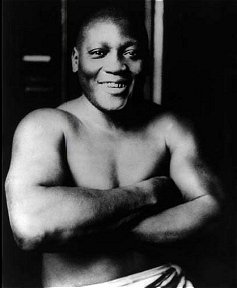
 Enter
seventeen-year-old Edgar Rice Burroughs.
Enter
seventeen-year-old Edgar Rice Burroughs.

 Now,
flip ahead to Byrne and Harding as they come out of the jungle to burst
upon this scene of Samurai warriors. Nice job of fictionalizing, huh?
Now,
flip ahead to Byrne and Harding as they come out of the jungle to burst
upon this scene of Samurai warriors. Nice job of fictionalizing, huh?
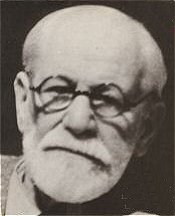 It
was during this period of the Great White hope that faith in the Melting
Pot doctrine was shattered by the great World War. After the War the Doctrine
of Diversity began to take shape which gained momentum after WWII until
becoming triumphant today. I consider the Doctrine of Diversity as silly
as the Doctrine of the Melting Pot, but as it is the prevailing mode I
will analyze the Affair Jack Johnson by its light. As the Doctrine is very
crudely thought out, if thought out at all, I am going to interpret the
Doctrine in the scientific light of Freud's Group Psychology and the Analysis
of the Ego. The two primary Groups in this case are the Irish and the Blacks.
It
was during this period of the Great White hope that faith in the Melting
Pot doctrine was shattered by the great World War. After the War the Doctrine
of Diversity began to take shape which gained momentum after WWII until
becoming triumphant today. I consider the Doctrine of Diversity as silly
as the Doctrine of the Melting Pot, but as it is the prevailing mode I
will analyze the Affair Jack Johnson by its light. As the Doctrine is very
crudely thought out, if thought out at all, I am going to interpret the
Doctrine in the scientific light of Freud's Group Psychology and the Analysis
of the Ego. The two primary Groups in this case are the Irish and the Blacks.
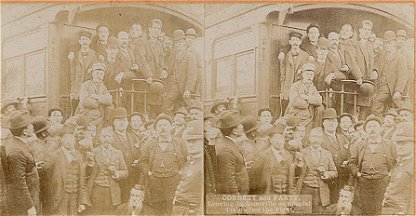
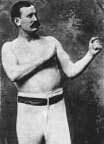

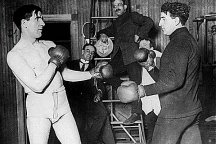

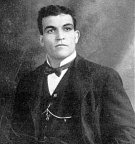



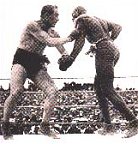 The
Negro Jack Johnson who had been fighting for several years wanted his shot
at the championship. Now, I make no moral judgments; I only tell things
as I see them. Burns felt a great deal of repugnance at fighting a Negro,
even though Johnson had been in the circuit for years. He did all he could
to avoid the match but Johnson ran him to ground in Sydney, Australia the
day after Christmas in 1908. Johnson was allowed only one seventh of the
pot, which he had to accept. Burns even insisted that his own manager serve
as referee. Nevertheless Johnson easily defeated Burns to win the Championship.
The
Negro Jack Johnson who had been fighting for several years wanted his shot
at the championship. Now, I make no moral judgments; I only tell things
as I see them. Burns felt a great deal of repugnance at fighting a Negro,
even though Johnson had been in the circuit for years. He did all he could
to avoid the match but Johnson ran him to ground in Sydney, Australia the
day after Christmas in 1908. Johnson was allowed only one seventh of the
pot, which he had to accept. Burns even insisted that his own manager serve
as referee. Nevertheless Johnson easily defeated Burns to win the Championship.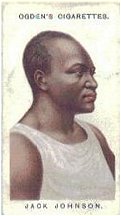
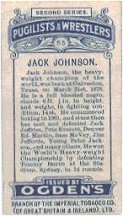
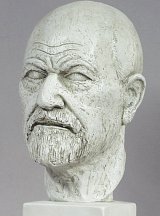 In
terms of Group Psychology the battle now became one of the Irish versus
the Negroes. Let's make a little digression now to look at the Doctrine
of Diversity in terms of Freud's notions of Group Psychology and
the Analysis of the Ego, plus his Inhibitions, Symptoms and Anxiety.
In
terms of Group Psychology the battle now became one of the Irish versus
the Negroes. Let's make a little digression now to look at the Doctrine
of Diversity in terms of Freud's notions of Group Psychology and
the Analysis of the Ego, plus his Inhibitions, Symptoms and Anxiety.
